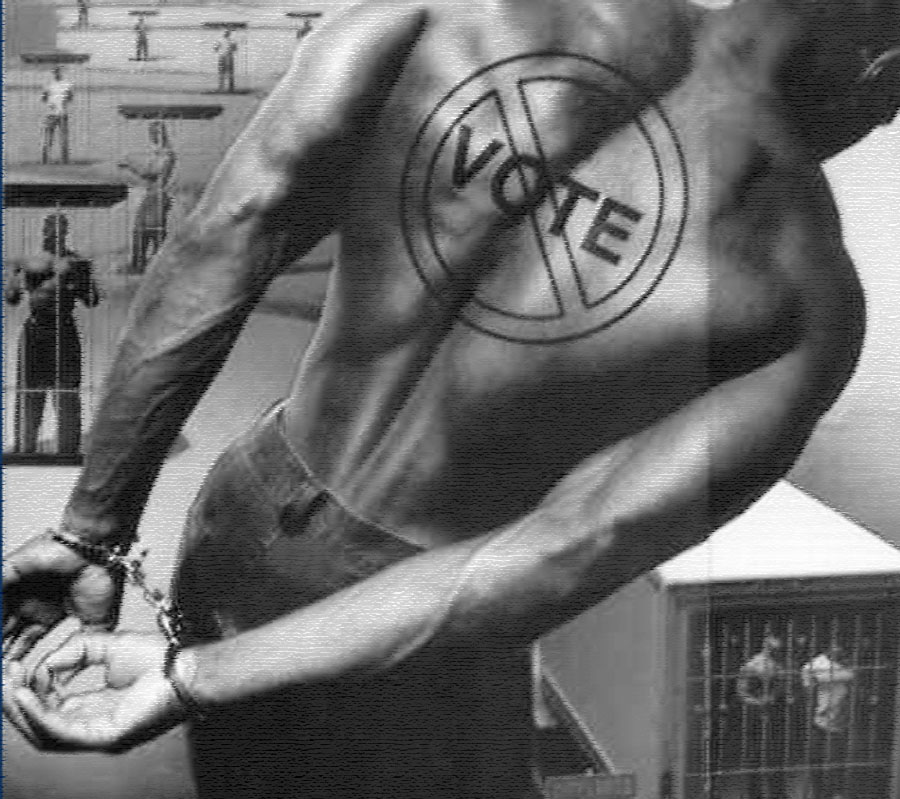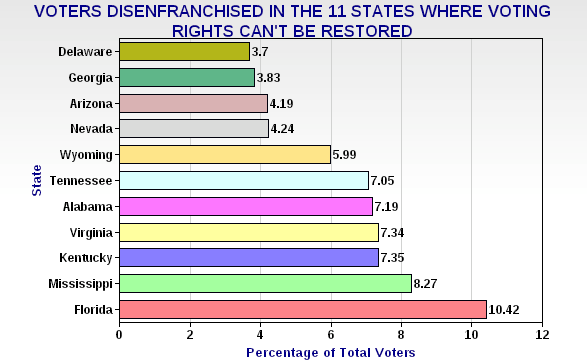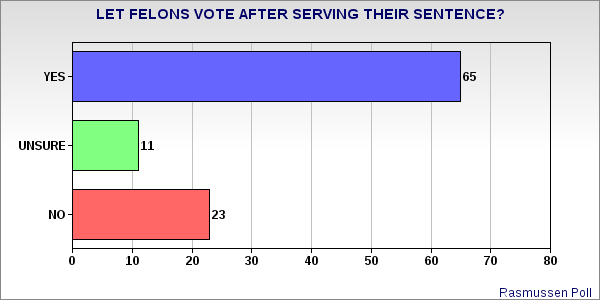Eleven states don’t restore voting rights to ex-felons, but a substantial majority of Americans believe that they should.
Attorney General Eric Holder brought up an interesting topic the other day while speaking at a criminal justice symposium at Georgetown University — the right to vote, or the denial of the right to vote for those who have committed a felony in the United States. This is important because it affects millions of potential voters in the United States.
While many voting rights are protected by the federal government and guaranteed by federal courts, there is one class of people in this country that have their right to vote determined on the state level. That is those who have been convicted of a felony crime. And the states do not agree on this issue.
Two states, Vermont and Maine, do not restrict the rights of convicted felons to vote at all (and they can vote by absentee ballot even while incarcerated). I like the position taken by these two states, because I think the right to vote is far too important to be taken away from any citizen — for any reason at all.
There are 37 states that allow a person to regain the right to vote — 13 states (and D.C.) allow a person to vote again after being released from incarceration, and 24 states allow a person to vote after being released from incarceration and completing their parole. These states follow a very American principle — that of believing people deserve a “second chance.”
While I would prefer voting rights to not be restricted at all, the position taken by these states is not an unreasonable one (since it at least provides a path back to full citizenship).
There are 11 states that don’t seem to believe in rehabilitation.
But there are 11 states that do not allow anyone convicted of a felony ever to regain the right to vote — and I believe it is these states that the Attorney General was directing his remarks toward. These states don’t seem to believe in rehabilitation. For them, anyone making a mistake must be branded by that mistake for the rest of their lives (by denying them any hope of restoring themselves to full citizenship status). And this is just wrong.
I worked in various aspects of the criminal justice system for most of my working life. I fully understand that there are some who are lifelong criminals and will never rehabilitate. But there are also many who do rehabilitate themselves — who turn their lives around and become model citizens.
And this “second chance” should be encouraged by states (including providing that path back to full citizenship). We should never forget that many of our own ancestors came to this country seeking a second chance for some reason, and they got it. Providing a second chance is a very American thing.
Here are those 11 states (and the percentage of voters that they deny because of felony restrictions to voting):
Part of those percentages are felons who are still incarcerated or on parole (and we can argue over whether they should be allowed to vote), but a good hunk of those percentages are people who have finished paying their debt to society. Those people should have their voting rights restored.
There is no good reason not to do this — especially since our criminal justice system is not completely fair (and punishes minorities and poor people more than whites or the wealthy). Refusing to restore voting rights just continues the initial unfairness of the justice system for the rest of a person’s life.
And I am not alone in believing felons deserve a chance to redeem themselves. A new Rasmussen Poll (conducted on February 12 and 13 of 1,000 likely voters nationwide, with a 3 point margin of error) shows a significant majority of Americans (65%) believe a people should be able to regain their voting rights once they have paid their debt to society.
They are right. Those offending 11 states need to change their rules — and if they won’t, maybe we should take care of this on the federal level. Voting is just too important a right to deny forever.
[Amarillo resident Ted McLaughlin, a regular contributor to The Rag Blog, also posts at jobsanger. Read more articles by Ted McLaughlin on The Rag Blog.]





















I am perfectly happy with this issue being decided on a state by state basis. I may not agree with the outcomes, but the closer to the people that rules are made,generally the better the outcomes for those who are governed.
I find it so ironic that most people/groups want it both ways. When they dont get their way at the state level, they push for national legislation and when they dont get their way at the national level they are happy to allow states to decide.
It happens on both sides of the political spectrum. I am pretty sure that the author had no problem when states ignored DOMA and passed gay marriage bills. But he also wants state prerogatives to be ignored when it comes to felon voting rights and urges national solutions.
Just proves that most people don’t care a wit about principle, they just want their will imposed on others by whatever means possible.
– Extremist2TheDHS
It depends on WHAT KIND OF FELON. Violent un-rehabilitated/un-rehabilitable young felony “Drug Offenders” or VIOLENT CRIMINALS. In Texas, this is decided by the “Future Dangerousness Commission” a Committee of Psychiatrists, MDs, Psychologists, MedicoLegal Forensic Scientists, various religious leaders, High-Level State .Gov Employees and CITIZENS. But they DO NOT have ANY “Crystal Ball”. Current tendency is to DENY Rights (legal and Human) to those convicted of ANY Felony. But it’s a sorta-workable STARTing approach. I am a 35-yr 4th-Generation UTexas School Of Law Grad & a Member of the State Bar of Texas “in good standing”/Int’l Business Consultant, and my best friend is a Ph.D. State-Licensed Clinical Psychologist WHO SERVED ON THIS ‘FUTURE DANGEROUSNESS” Committee. Because of various ethical and confidentiality Rules & Laws, he can’t tell me much- except that it was the hardest job he ever had.
PS: I also agree 100% w/ Extremist2TheDHS’ Reply above…
I find it ironic that we as a nation find it acceptable to punish a person for the rest of their natural lives by taking away the one place to be guaranteed a voice…the ballot box. It should not matter if they are arrested 90 times, if they serve out their time to include probation/parole they should be allow to voice who they feel should making decision that will affect them for the rest of their lives. This is nothing short of a crime in itself by stripping a person of a basic human right, the right to vote.
Well Geri,
Its not our “nation” that punishes people for the rest of their lives, that punishment is decided, as the author noted, state by state.
If you live in a state where the majority of your fellow citizens agree with you, then your point of view may be the law. And in states where citizens disagree with you, (you do agree dont you that other people are entitled to their own point of view?) they can live under different laws. Like all of us, you have the ability to move to a different state if an issue is very important to you.
I think that is a far superior method of governing (obvious exceptions of course apply) than having 535 corrupted congresspeople deciding this issue for us.
– Extremist2TheDHS.